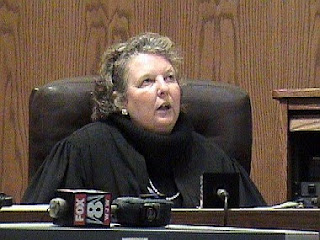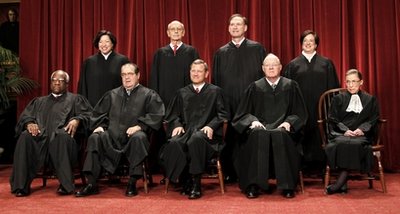 |
Judge's directions
A fair trial depends on the combined efforts of jurors as the deciders of the facts and the judge as the final authority on the law. The jury must apply the law (as stated by the judge) to the facts as it finds them to be .
If the judge gives you any instruction that seems to conflict with anything contained here, you must accept what the judge tells you as being correct and be guided only by the judge.
Opening statements
At the start of a criminal trial the Crown prosecutor will make an opening statement telling the jury what the alleged offence is and what the evidence is expected to show. The accused person's lawyer may also make an opening statement.
These statements are not part of the evidence. Their purpose is to give you the framework of the case, the points of conflict and the issues to be decided.
Prosecution case
After the opening statements, the presentation of evidence to the jury begins.
When a witness is called to the witness box by the prosecution and sworn to tell the truth, he or she is questioned or 'examined' by the Crown prosecutor. Then he or she may be questioned or 'cross-examined' by the defence barrister. The aim of cross-examination is to test the accuracy of the evidence or emphasise certain parts of it. Sometimes the prosecutor 're-examines' the witnesses to clarify something that has come up in cross-examination.
This process of questioning witnesses may be lengthy, but it is important to listen attentively to all of its evidence and to examine any documents, photographs etc which are put before the jury.
Defense case
When the prosecution has finished, the defence can call witnesses or present other evidence if they choose to. In a criminal trial the accused is presumed innocent and it is up to the prosecution to prove guilt.
The same process of examination, cross-examination and re-examination will occur with any witnesses called by the defence.
Evidence
The evidence consists of:
- oral evidence given by witnesses, and
- physical objects such as photographs, documents, firearms, exhibits etc.
The jury's verdict must be based solely on the evidence presented during the trial. Because evidence is so important, there are strict rules about what evidence can be given in court and the sorts of questions that can be asked. The lawyers on either side may object to the questions asked of witnesses or to other evidence. The judge then makes a ruling on whether the evidence is admissible, based on the law.
Sometimes jurors are asked to leave the court while these legal points are discussed by the judge and lawyers. This may seem time-consuming, but it is important that the rights of all parties are protected and that questions of law are properly decided by the judge as they arise. The jury should not feel resentful at being excluded. The judge will ensure that the jury is properly informed of everything it needs to know about the law or facts in order to reach a verdict.
Final addresses
After all the evidence has been given, both sides will have the opportunity to present their final submissions to the jury. As with the opening statements, this is not part of the evidence. You should listen to these submissions and consider them thoughtfully, but you must form your own opinion of the facts.
Judge's charge to the jury
After the final address from each side, the judge summarises the case and gives instructions to the jury. It is vitally important that each juror listens to all of these instructions and understands them because the judge will define the issue to be decided in the case and set out the relevant law.
Civil trials
The order of events in a civil trial is similar to that in a criminal trial.
The plaintiff's representative goes first and starts by explaining what the case is about and how it will be presented. Witnesses for the plaintiff are questioned and cross-examined. Then the defendant's witnesses are questioned and cross-examined.
At the end of the evidence, each side gives a summary of their case to the jury, and the judge will give the jury instructions.
Jury retires to consider verdict
After all the evidence has been given and summed up in court, the judge will ask the jury to retire to the jury room to consider their verdict. During this time you must not talk to anyone about the case except other jury members. All discussion must take place in the privacy of the jury room and when all jurors are present.
Hours
Once a jury retires to consider their verdict, jurors will have to stay together at lunchtime – lunch will be provided.
Towards the end of the trial the judge will give you more details about arrangements during the jury deliberation period.
In most cases the judge will permit the jurors to go home each night. If allowed to go home, each juror will be required to swear (or affirm) that he or she will not discuss with any non-juror anything relating to the evidence in the trial or to the deliberations of the jury.
If the jury wants to finish its deliberations early on any day the judge will deal with such a request.
Sometimes you may be required to stay later than 4.15 pm or even stay overnight until a decision is reached. You will normally be told the day before if you are required to stay overnight so that you can bring an overnight bag the next day. Otherwise the Juries Commissioner will make arrangements for you. You will be provided with meals and accommodation. Messages can be passed on to family and friends.
If the verdict is given late at night, the court will arrange transport home if necessary.
Jury decision-making
Provided you always follow the judge’s instructions about the law, you are free to deliberate in any way you wish. The discussion in the jury room is chaired by the foreman/forewoman. He or she should ensure that discussions are carried out in a free, unhurried and orderly way, focusing on the issues to be decided and letting each juror have a chance to participate in discussion.
During the deliberations jurors should keep an open mind, listen carefully to everyone and be prepared to tell others on the jury what they think and why.
Be prepared to change your mind when there is good reason for doing so. At the same time try not to be overly influenced by other people’s ideas and recollections. Even if someone has taken notes, this does not necessarily mean that his or her notes are more accurate than what you remember of the evidence. If the jury requires assistance as to what any evidence was, the judge can provide such assistance. Do not hesitate to ask.
When the jury is arriving at a verdict, every juror’s opinion counts. It is important to respect the opinions of other jurors and value the different viewpoints that each juror brings to the case. This will help the jury to reach a fair verdict. Let your fellow jurors have a chance to say what they think and why. Do not intimidate anyone else. Equally, do not be afraid to speak up and express your views.
How long it will take to reach a verdict
The jury must reach a unanimous verdict unless the judge tells them otherwise. Do not rush your decision. The court will give you as much time as you need. The people involved in the case deserve your complete attention and your thoughtful deliberations.
It is important to consider all the evidence carefully. All jurors should feel comfortable with the verdict. No juror should feel pressured to change their mind, just because everyone else has reached a different conclusion or because it is taking a long time to decide.
Remember, your decision will have a significant effect on the lives of other people. |


No comments:
Post a Comment